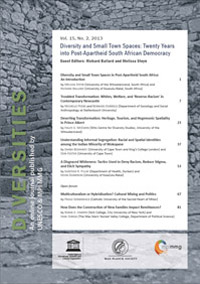Deserting Transformation: Heritage, Tourism, and Hegemonic Spatiality in Prince Albert
by Haley A. McEwen (Wits Centre for Diversity Studies, University of the Witwatersrand)
To cite this article: McEwen, H. A. (2013). Deserting Transformation: Heritage, Tourism, and Hegemonic Spatiality in Prince Albert. Diversities, 15(2), 23–36. https://doi.org/10.58002/8xr9-w848
While tourism is often pitched as a panacea for economic growth in developing countries, it has also been shown to reproduce colonial dynamics of unequal power relations between the West and former colonies and between the historically privileged and the oppressed within post-colonial nations. Through critical discourse analysis of data, this article considers how the mobilization of ‘heritage’ and ‘tourism’ by ‘semigrant power-elites’ in Prince Albert, a rural South African town, reproduces historically inscribed relations of power which remain shaped by the apartheid era’s use of space in the construction and enforcement of a racial hierarchy. Analysis aims to intervene in presumptions that tourism development is necessarily a path towards economic empowerment for historically oppressed populations. Interrogation of discourses promoting heritage and tourism development in the town uncovers the ways in which structures of inequality established through colonialism and apartheid can accumulate through tourism development.
Keywords: tourism, heritage, post-apartheid, race, space, semigration
|
